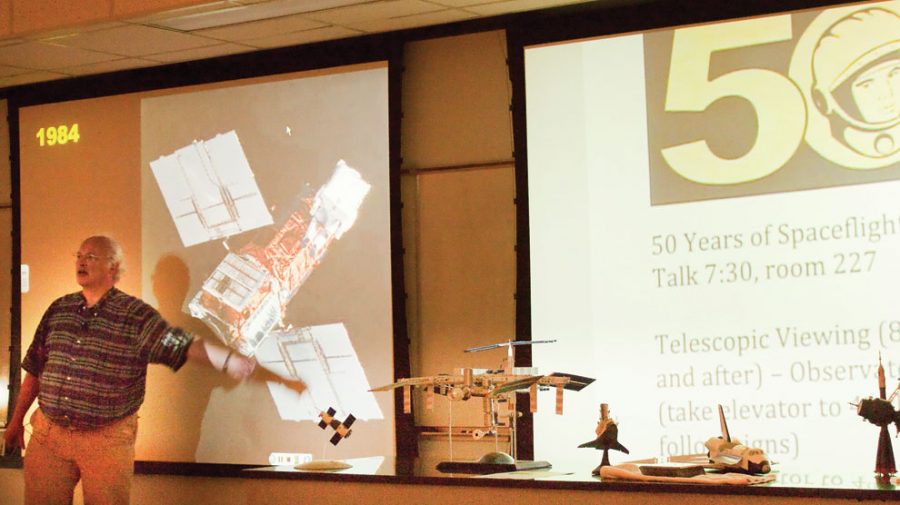For some, April 12, 2011, was just another day. For others, it was a return to an age of wonder and exploration. The date marked the 50th anniversary of the first human space flight, accomplished by Russian Yuri Gagarin. To commemorate the occasion, William Keel, professor of astronomy, presented the past 50 years of spaceflight and “the way the future was.”
The event, held in Gallalee Hall, began with a history of space flight. Afterward, visitors peered through the rooftop telescope for a glimpse of the moon and Saturn.
“I was pretty pleased [with the turnout] because for a lot of the people here, a lot of this stuff is sort of ancient history,” Keel said. “We’re still seeing its repercussions in decisions being taken at the national level in policy today, and they’ll be having implications right down through the lifetime of people who are students now.”
Beverly Hawk, director of Crossroads Community Center, was among those who gathered for the presentation.
“I saw [the event] on the website and wanted to look through the telescope,” she said.
The presentation gave a detailed look at the many stages of space flight, starting in 1961 with the space race between the United States and the Soviet Union and ending with present-day endeavors. Keel described the advancement we have accomplished and the obstacles we have overcome.
“A dominant factor [of space ventures] was the Cold War competition. It was a non-lethal arena where the two nations could show off,” Keel said. “Apollo was driven by the imperative ‘waste everything but time.’”
Space flight is no longer limited to two countries, however. In 2003, after a “low-key program,” China launched its first traveler, Yang Liwei. Also, nations such as Japan, Canada and Brazil participate in the International Space Station.
No longer reserved for national heroes, a trip into space is much more common today thanks to Richard Branson, owner of Virgin Galactic. The company allows those with the proper expenses to become the astronaut they have always dreamt of being.
“I’ve always, since I was little, been interested in space and science,” said Woody Comer, who came from Hoover for the commemoration. “I’m old enough to remember all of that. I can remember Sputnik… I was thirteen at that time.”
Guests, who stayed for the telescopic portion on the roof, caught a magnificent view of the sky.
“There were two views of the moon, one real close up that was neat and one of the whole moon,” said Sean Kearney, a student majoring in business management.
After 50 years of space exploration, NASA is retiring the space shuttle program after former president George W. Bush ordered budgetary reductions in 2003. However, NASA is continuing to work on rocket ships that may one day take astronauts beyond the moon.







